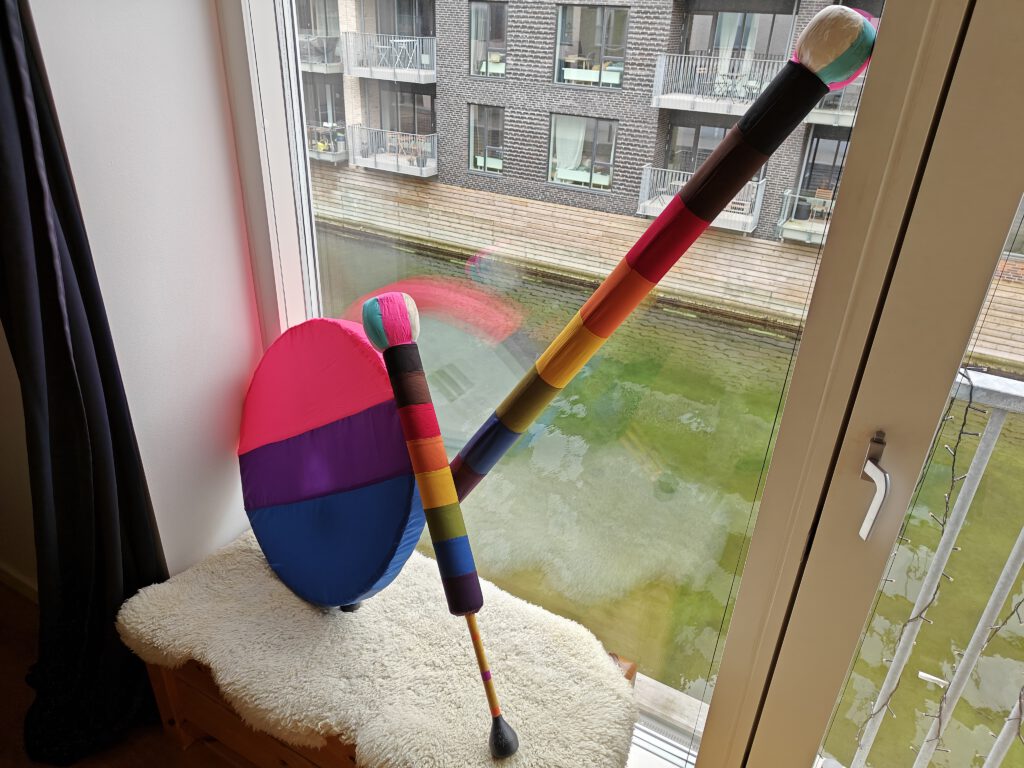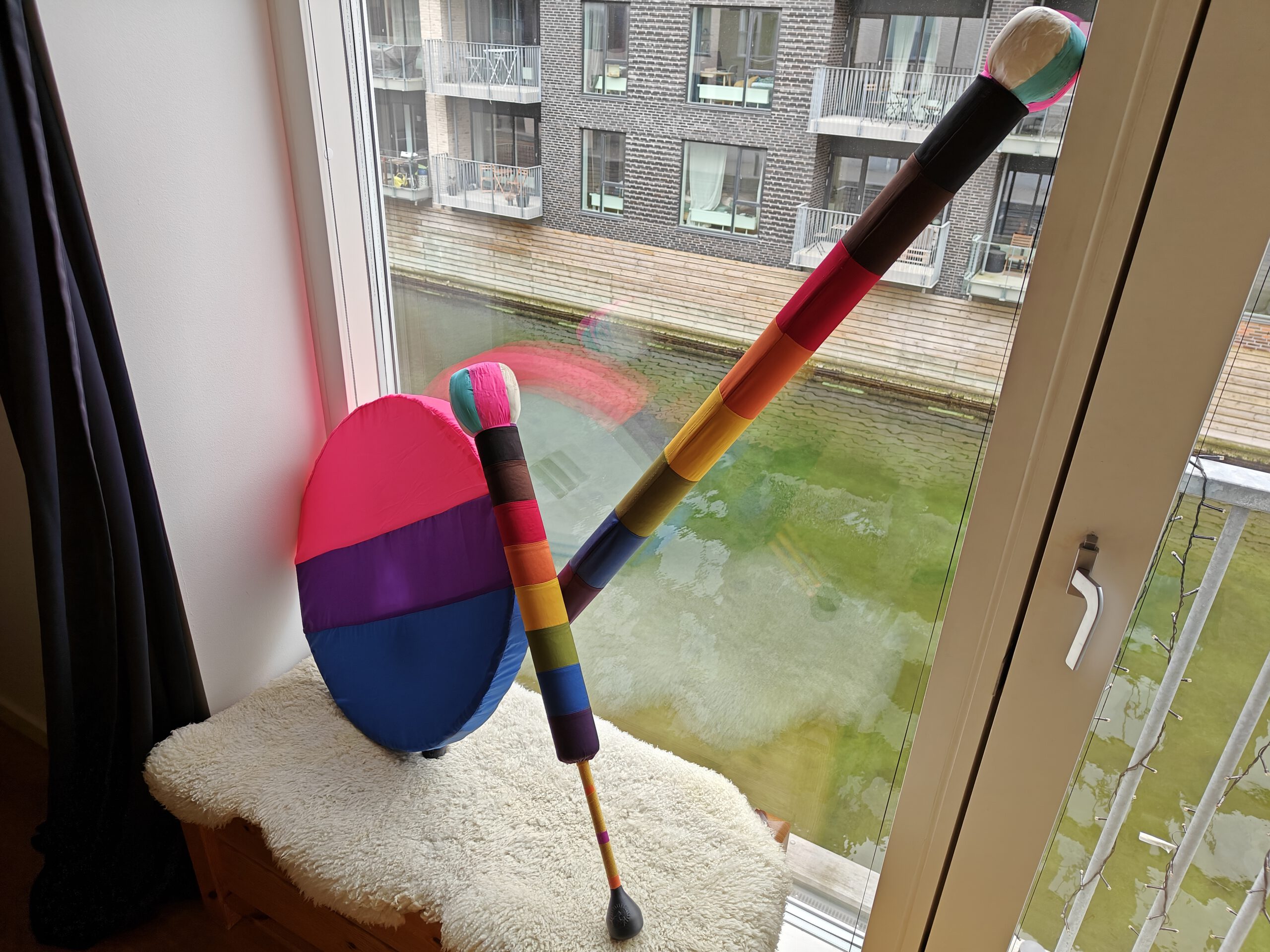
At first, it was the toxicity within the GameDev and wider Gamer community, (not that I’d necessarily fear Gamer Gate style repercussions by “Fans”, but more the signals implicitly sent via the lackluster response and support for those affected by some companies) then internalized biphobia and “questions of propriety” that held me back from bringing my most authentic self to work. I’ve been more lucky than most in that I “only” experienced latent and relatively mild forms of queerphobia, and yet that was enough. Enough for it to take me 13 years in this industry, to date, that I’ve only slowly and very progressively come out as bisexual.
If you follow me on Mastodon or met me in person since February 2023 that last half sentence was probably not surprising. That’s about the time I decided my working environment and general prospects within the industry were good and secure enough to not just learn how to unmask my Autism and ADHD and talk about it at work, but generally be as authentic and up front as I can be, rainbow & bi-pride buttons on my backpack, bi-flags on my noise-cancelling-headphones and all, fighting bi-erasure by constructing a bi-visibility shield of sorts.
Well, as you can tell by the picture, as of last week I have a literal Visi-Bi-lity-shield for playing Jugger 😉
Physical vs Online Spaces
I’ve described last year to some as the difference from continuously coming out to progressively more and more people over the last 15 years, to now being out. It might not sound like much of a difference but it is. Going from wondering when and to whom I might come out and under what circumstances or if they will somehow find out before I can do so on my terms, to an entire train of potential worrying thoughts just dissipating is hugely liberating.
Yet, there is a difference to being out in physical spaces vs online spaces. And in Online spaces there are further differences per platform and and level of anonymity/ likelihood of information bleeding from one sphere of life to another.
Further, there are differences in visibility, e.g. online spaces come with short bios, tags and emoji as well as a potentially searchable posting history, whereas physical spaces require different forms of clues or codes to be inserted. “Thanks” to the Hayes Code and the influence of US based entertainment media, there is a good set of those for the gay and lesbian community, ranging from subtle to relatively obvious. For people under the Bi+ umbrella, that is not the case, also thanks to Bi-erasure. Flags and pins are some of the few readable options out there, which can be both too obvious for ambiguity and too subtle for those not quite deep enough in queer culture.
The cesspool that always existed on Twitter was not the platform for me to be out on, especially not under a handle that was very closely tied to my professional life. Switching to Mastodon was a shift like night and day by comparison. In a way, it was a continuation of my Twitter presence. I forwarded my connections on Twitter to Mastodon, moved to a GameDev based instance and used my full name on it. Yet it felt soooo much safer to connect into Bi+ and Neurodiversity Communities (with large overlaps) that in witnessing the broad and friendly open conversations, coming out via my bio happened within 3 months.
Reaffirmed by feeling connected, accepted and welcomed online, no less in a community that was industry related, I brought it into the physical workspace. Yet, LinkedIn felt like another big step I didn’t quite feel ready for until now.
Why does visibility matter to me and why at work?
Well, for instance, I’ve had a superior who aggressively and publicly reprimanded me to stay wide and clear of talking about dietary choices that clearly & visibly none of the people at that work dinner nor the company in general subscribed to, while the same superior sat by and, possibly related to my invisibility at the time, said nothing about a colleague’s (my senior) casual and regular use of homophobic slurs (sort of directed at me). That combination further contributed to this post taking 13 years.
But more importantly because I can be visibly and loud, out and proud. I have the incredible luxury and privilege of feeling safe enough to do so. And as much as I hate it, that is in part due to patriarchy and other systems of oppression I’ve benefited from. They’ve contributed to me getting to the position I’m in now and also mean I’m unlikely to drastically increase my risk of getting sexually harassed at work due to coming out.
Further because I hope I can shine a light on how, just as in my anecdote above, you shouldn’t assume your slurs and microaggressions are OK just as long as you don’t see anyone in the room as queer.
And because I’d like it to be an open invitation to anyone to reach out if they are struggling, need to talk or just want to connect and share experiences. An offer to support each other.
Some might say, since I’m in a straight passing relationship, I don’t have to be out at work, so why would I? I believe that not having fully processed my internalized biphobia and asking myself this question is what held me back from being out on LinkedIn. So if that’s a thought you might have, I invite you to reflect on why you’d think that way, if it is different to other (sexual) minorities and why. Chances are high it’s because of patriarchal notions of propriety and the discomfort with ambiguity that the queer movements have often had to appease and sidestep and, after long and tiring fights, had to settle for achieving minority acceptance status for the moment, as long as everything still falls roughly in line with the supporting structures of hetero- and mono-normativity and as long as everyone “stays within their own lines”.
Well, I, like so many others under the Bi+ umbrella, don’t fit within clear lines and I have as much a right to living a life that is authentic and true to myself, in all walks of life, as anyone. And I’m ready to fight for it, for everyone. We’re not free, until we all are. Nothing and no one is safe, as long as patriarchy itself still stands.
For me the conversations I’ve had since being out at work have already been the greatest benefit I’ve felt since last year. I can not overstate how impactful it has been to find that through shifting from continuously coming out, to being out and visible at work, I’ve been able to connect with coworkers at a whole different level. Finding more community at work and through making myself more vulnerable, inviting others to share their struggles and listening or even being able to help each other navigate difficult situations by talking through them is deeply rewarding and not something I’d ever want to miss again.
So I hope we can continue the fight to make workspaces more inclusive and welcoming, so that others, regardless of orientation, ability or other circumstances, can feel safe enough to be authentic and out and benefit in similar ways.
Further Reading
There are a myriad of other reasons why visibility matters to me and what particular issue specifically bisexual people face but there is no way I could do that justice here. Instead, if you are interested in going a bit deeper on the topic I’d invite you to check out the following resources.
- Podcast: Bisexual Brunch going over a potential Bisexual Manifesto, what policy changes they might ask for from (UK) politicians. It also provides a good allround intro into a good chunk of the issues unique to bisexuality, including issues faced by asylum seekers, issues with healthcare, media representation, invisibility even within LBGT+ organisations, as well as some insides into living as an out bisexual in Afrika.
- Julia Shaw’s book: Bi – the hidden culture, history and science of bisexuality which places the identity within the wider cultural and historical context while going over the science and issues faxed by bisexuals. E.g. did you know that from all the subgroups within the LGBTQIA+ community, bisexuals, regardless of sex assigned at birth, have the worst mental and physical health outcomes? That Bi+ women are twice as likely to experience sexual harassment? (Here‘s a podcast episode about the book with the author)
- Shiri Eisner’s book Bi – notes for a bisexual revolution making the field of gender studies and the discourse on bisexuality accessible to anyone while outlining the unique challenges and opportunities for bisexuals.

Leave a Comment